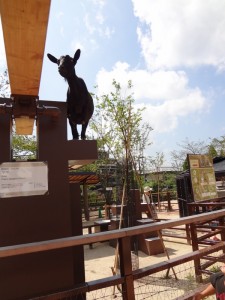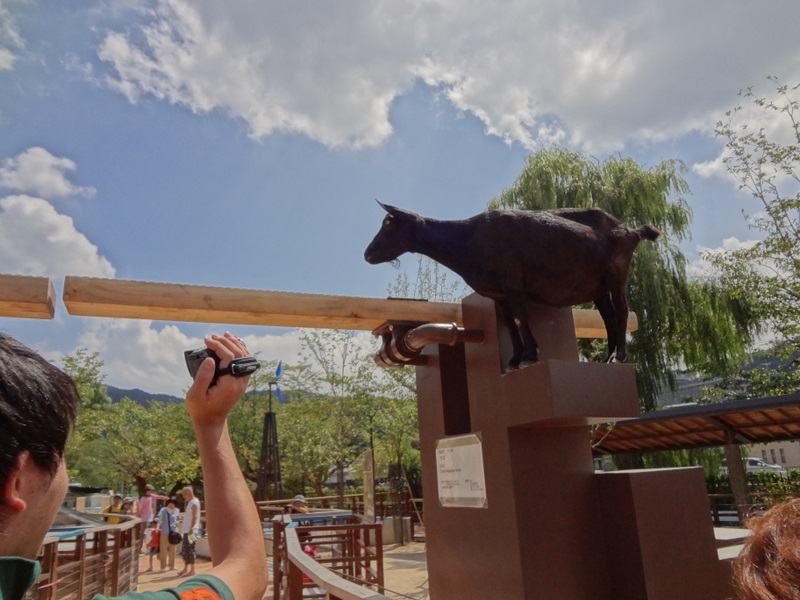My CIP was spent at the Kyoto Municipal Zoo, in Oyazaki Park. As I mentioned in my earlier post, I have wanted to work with animals ever since I was a young child. Whenever anyone asks me what I want to do with my life, I say “A large exotic mammal veterinarian at a Japanese zoo,” which is simply an amalgamation of all my interests. I have been working for four years at a small animal clinic, but never have had the chance to work at a zoo, so I was very excited at the opportunity to volunteer in Kyoto and get that much closer to my ultimate career.
My time was spent almost entirely in the goat pen of the Children’s Petting Zoo, where I explained facts to visitors and did my best to answer their questions. I also was there to assuage the fears of kids unsure about petting the animals. Much of my interaction consisted of speaking in a friendly tone and saying “The goat is nice. Would you like to try and pet him?” I was also briefly assigned to the petting room where we helped visitors hold rabbits and guinea pigs, but this required more Japanese than I could quickly explain to a young child so the goat pen ended up being a better fit.
My co-volunteers were probably the most unique part of my CIP. The vast majority were female, usually older middle-aged ladies who spent every weekend at the zoo, giving up mornings and afternoons. Before I had decided on a CIP, I had looked forward to building camaraderie with Japanese peers, and in this way the make-up of the volunteers was somewhat of a disappointment. I was an outsider in age, gender, and nationality. This did not manifest itself in any sort of coldness. Quite the opposite, the other volunteers were always very kind and patient and eager to answer my questions, and quick to start a conversation when there was a lull in visitors. Not only this, but at the start and end of every session, we would discuss any questions or problems we had during the day. The meetings made the group feel more like a company, which in some ways it was since “Kyoto City Zoo Volunteers” is an established organization. It was comforting when I needed help to know I would have somewhere to voice my concerns. While I was working with these other volunteers, the majority of my Japanese interactions happened ‘in field’ so to speak, with visitors.
Looking back on my time at the zoo now, it is hard to remember exactly what I expected out of this CIP, particularly since I had not seen a zoo before, except as a visitor. I think I thought I would be working in more than just the children’s zoo, perhaps with more variety of tasks. But at the same time, staying only in one area gave me much needed time to practice the explanations and phrases I picked up over time. Over the weeks and months I became familiar with the routines and explanations, and even learned all of the goats’ names by heart. Being immersed in an activity and environment that had felt so foreign and awkward at the start was by far the most rewarding part of my CIP experience. I could feel my confidence grow week to week, and by the end I was happy to engage visitors whole heartedly, where before I would timidly watch from the edge of the pen. When I had begun, I was unsure exactly if and how to initiate discussion and this is where my job of showing kids how to pet the goats came in handy. I learned to let the customers come to me, and then greet them with a hearty “Welcome, good morning!” pat one of my favorite residents of the pen, and let things unfold naturally. For some visitors, I was just as interesting as the animals, and I ended up giving a ten second biography of how I ended up in a goat pen in Kyoto at least a few dozen times.
I am very happy I got the chance to volunteer at the Kyoto Zoo. It gave me a chance to feel how Japanese work together, and just get used to a zoo as a work environment. I did end up finding Japanese friends outside of my CIP, so the difficulty of forming friendships outside of work was less of a problem. I would say, though, that if I were to do things over again, or were staying the entire year, I might like to try a circle or club so I could get more time with Japanese my own age, if just for the chance at more Japanese practice.. I am happy, though that I felt at ease and comfortable in the routines of the program by the end of the semester, because it gave me tangible evidence that my Japanese, or at least my social skills, were improving. I am also glad that I am at least a bit closer to realizing my career as a ‘large exotic mammal veterinarian at a Japanese zoo,’ even if I’m going to need a bit more Japanese under my belt



